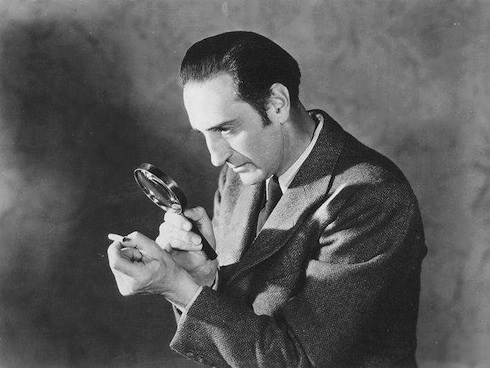Sherlock Holmes stands out among fictional characters insofar as a staggering amount of actors have interpreted him on the stage and screen for over a hundred years. Holmes himself has been called numerous things: intellect, superhero, amateur, specialist, addict, liar, egomaniac, and most recently “a functional sociopath.” But has anyone really nailed it all? Which actors throughout the years have given us the best Sherlock Holmes?
Obviously there are far more actors who have played the great detective beyond the ones I’ve listed below. Yes, I’ve excluded Michael Caine, Christopher Plummer, Jonathan Pryce, Roger Moore, Ellie Norwood, Tom Baker, and even John Cleese. But I consider the ones discussed below to be leading contenders, the winning horses, if you will, in the conversation about Sherlock Holmes as interpreted by an actor.
Paget’s Pen & Brush
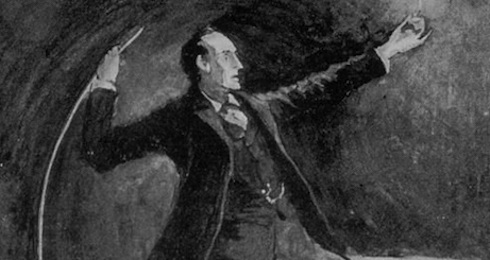
Though not an actor, the early drawings in The Strand compromise the first visual representation of the famed detective. While the physical details of Sherlock Holmes come from Doyle’s description of the character, it is invariably the illustrations of Sidney Paget that burned the most lasting impression of Holmes into the collective conciseness. Notably, the assignment of Sidney Paget as the illustrator of the Holmes stories was an accident, as Sidney’s brother Walter was also an illustrator and the intended recipient of The Strand Magazine’s contract. However, because we live in this universe, the most famous visuals of the great detective come from Sidney by way of a postal error. Though Doyle allegedly found these depictions of Holmes to be “too handsome” the Paget drawings doubtlessly influenced the casting of the character for the stage and screen for years to come. One could even argue that the small arrogant smile, present in many of Paget’s drawings later influenced the actors who played him. (For on on Paget, click here.)
William Gillette
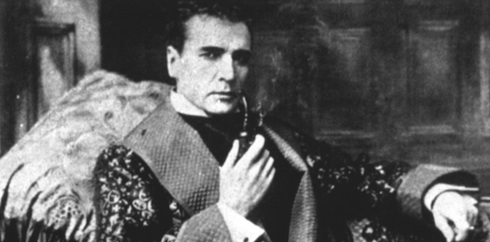
If there is one actor who is truly responsible for the various Holmes acoutrements, such as the cloak, the hat, the pipe, or the robe, it is William Gillette. Gillette not only starred as Holmes in the stage play Sherlock Holmes, he also adapted his own version! The original version was a five-act play written by Doyle, which Gillette changed to a four-act structure, with Doyle’s approval. According to various accounts, when Conan Doyle met with Gillette to approve this project he felt as though Sherlock Holmes himself had stepped off the train to meet him. Interestingly, Gillette was an American, and was most famous throughout his career for this part. Many of the “incorrect” assumptions about the character come from this version, such as “Elementary, my dear Watson,” a phrase which never actually appears in the books. When one thinks of a sort of traditional version of Holmes, that interpretation most likely comes from Gillette, who played the character in nearly 1,300 performances throughout his life. Was he faithful to the original work? The verdict seems to be: kind of. However, at the point at which Doyle himself was around to endorse his interpretation, Gillette remains one of the most canonical Holmes actors of all time. Gillette’s portrayal of Holmes was so popular that during the 1932 farewell tour, novelist Booth Tarkington said “I would rather see you play Sherlock Holmes again than be a child again on Christmas morning.”
Basil Rathbone
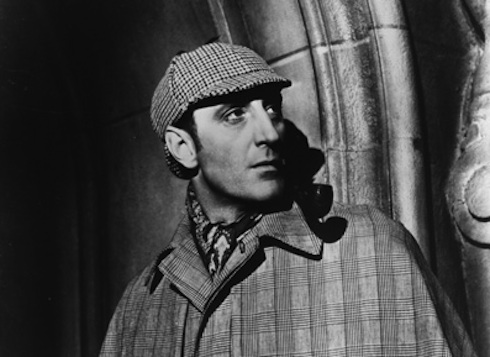
The famous screen actor, though born to English parents, was from South Africa. Thanks to his Shakespearean background and a turn at dueling with Errol Flynn in films like Captain Blood, Rathbone was already a major star before he took on the role of Holmes. Rathbone’s tenure as Holmes is probably largely responsible for making The Hound of the Baskervilles the most wildly remembered Holmes title amongst the general public. His first Holmes role was a full-length film of Baskervilles in which, along side Nigel Bruce as Watson, Rathbone delivered a proper Victorian Holmes in keeping with Gillette’s interpretation. Rathbone is of course a great character actor and highly convincing as Holmes. However, despite having a bumbling and useless Watson, the Rathbone tenure has two major problems. The first is that Rathbone continued the trend started by Gillettte which emphasized Holmes as a gentleman. The sort of unkempt crazy-person of the stories and novels isn’t as evident in Rathbone’s performance, which is instead the more cartoony Holmes many pictured for years and years. Second, post-Baskervilles the majority of the Rathbone adventures are NOT adaptations of any kind and set in a WWII timeline. This is not to say putting Holmes in a timeline other than the Victorian era is bad, but at the point at which Rathbone’s Holmes was more of a caricature than a character, the jingoistic aspect of these stories only made that quality worse. The real crime isn’t Rathbone himself here, but rather that the majority of his Holmes work feels dated.
Peter Cushing
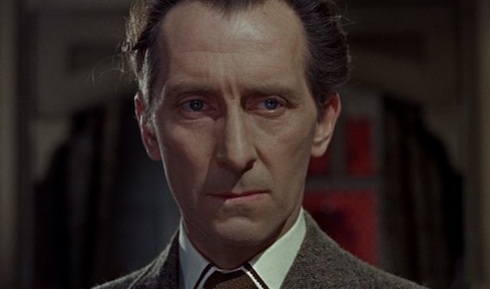
Of all the actors to play Sherlock Holmes, Cushing perhaps looks the part more than others, specifically the hawk-like nose. In the grand scheme of various actors who have assumed this mantle, Cushing often gets lost in the shuffle because of various other and perhaps more famous performances. However, Cushing brought a level of theatricality to the detective that was more intense than Rathbone, and more nuanced than some of the later incarnations. Cushing’s Holmes is one that has a lot of “Ah-ha!” moments in which he demonstrates in broad strokes just why he is such a genius. (A certain scene from The Hound of the Baskervilles in which Cushing throws a knife onto a letter springs to mind.) There is nothing particularly wrong with Cushing’s portrayal of Holmes at all, other than the fact that he has such stiff competition. If the depiction of Holmes on the screen had ended with Peter Cushing, the world would be just fine. However, it didn’t.
Jeremy Brett
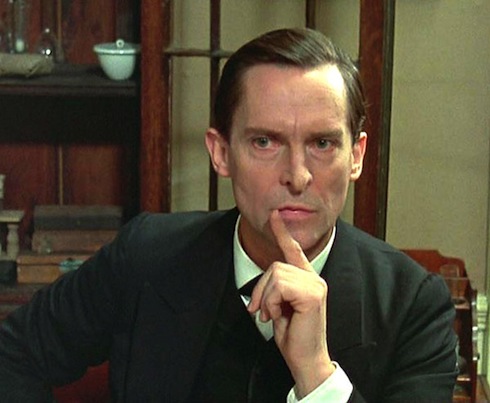
In the 1980s, Granada Television set out to do something that had yet to be attempted with the canon of Sherlock Holmes: faithfully adapt all the stories and novels. Though minor changes and framing devices were altered throughout the run of this series, for the most part the accuracy to the source material is striking. Anyone who has seen the first two seasons of the Jeremy Brett era will agree; he may well be the definitive screen Sherlock Holmes. From his flippant arrogance, to his deadly serious demeanor, Brett perfectly blended the bohemian and messy Holmes with the Victorian gentlemen of the public consciousness. The costumes of Brett’s Sherlock were also fantastic because it reminded us that Holmes wasn’t about the deerstalker and the magnifying glass, but rather about the person. Brett’s performance also brought something somewhat new to the role: Holmes was human.
The character’s drug addiction is addressed with this Holmes and his feelings for Irene Adler are explored with more tenderness than in the original text. This Holmes is also hilarious. I’ve heard many fans cite this as something they didn’t like about Brett’s portrayal, however if you’ve never laughed out loud while reading Sherlock Holmes, then I think we’re reading different books. Brett’s Holmes was funny, messed up and sexier than previous Holmes. (He was considered for James Bond in the 70s!) Though some of the later episodes and TV movies are hard to watch as this great actor’s health deteriorated, he is still one of the best actors to ever tackle the part.
According to various interviews with Brett, the part deeply changed him as he found he had so much in common with Sherlock Holmes. In short, poor Jeremy Brett went a little bonkers from playing this iconic character, a character who is also a little bonkers. And though it is a tragedy that Mr. Brett was taken from us so early in his life, we’ll always have his perfectly mad Holmes to enjoy forever.
Robert Downey Jr.
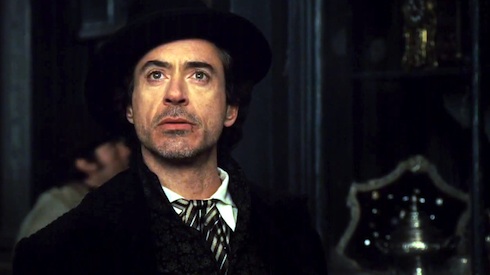
In 2009, Guy Ritchie decided to remind us that Holmes could handle himself in a fight as well as be an awesome intellect. Robert Downey Jr. then punched, kicked and shot his way through a pseudo-steampunk version of Sherlock Holmes. What irritated me about this movie actually had nothing to do with Downey Jr. Instead, the level of physical violence annoyed me. I get extremely tired of people telling me how “in the books Holmes fights people.” Let’s be serious, this doesn’t happen that often, and just because Holmes and Watson can take care of themselves in a dust-up doesn’t mean they are thugs. And in the Guy Ritchie movies, they’re thuggish.
BUT, this is not to say that Robert Downey Jr. isn’t a good Holmes. He’s actually great as Holmes. He combines the intellect with the insanity with such a smooth ease that sometimes you forget he’s the famous actor that he is. In terms of an actor who really shows how messy and screwed up Holmes is, Downey Jr. might be the best ever. This is closer to what Conan Doyle intended; a messy addict who happens to be more brilliant than everyone around him. The only problem I have with this Holmes is that he occupies a boring action-movie narrative. Both the character and Downey Jr.’s portrayal are better than this.
Benedict Cumberbatch
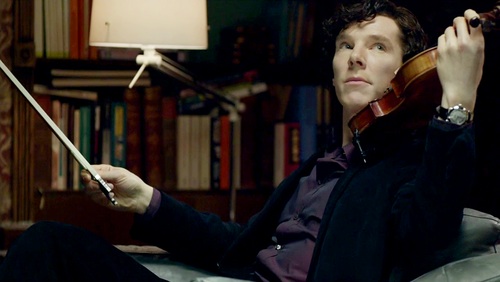
The most recent Holmes is easily the best since Brett. Unlike some of the WWII era Rathbone Holmes, the transportation of the character to a non-Victorian setting actually does Cumberbatch a lot of favors. Cumberbatch is arrogant, confident, funny, hyper intelligent, and absolutely social awkward. The way in which the various famous Holmes maxims are paraphrased in this version breathes new life into the character. The fact that writer Steven Moffat decided to play up Sherlock’s ignorance on a variety of subjects is a masterful move. Many a casual fan might forget that Watson drew up a list of Sherlock’s knowledge on various subjects in A Study in Scarlet, which demonstrated the great detective had limited information about all kinds of things, including knowing nothing about astronomy. In the text, Holmes refers to his mind as being like an attic full of furniture whereas Cumberbatch asserts, “this is my hard drive!”
Because there are so many moments when Benedict Cumberbatch owns the fact that he IS Sherlock Holmes, it’s hard to pick just one. Perhaps my favorite is when he is looking out the window of 221B Baker in “The Great Game” and describes the quiet peaceful atmosphere of the street below as “hateful.” Holmes thrives on conflict and hates boredom above all else. This, more than anything is the character. And Cumberbatch plays that aspect perhaps better than anybody.
What about you? Which Holmes is your favorite? Does it matter to you how accurate he is to the text? Do you like your Holmes funny or dark? Proper or sloppy? Let us know!
Ryan Britt is a staff writer for Tor.com. He has written about Sherlock Holmes for Tor.com as well as Clarkesworld Magazine.










